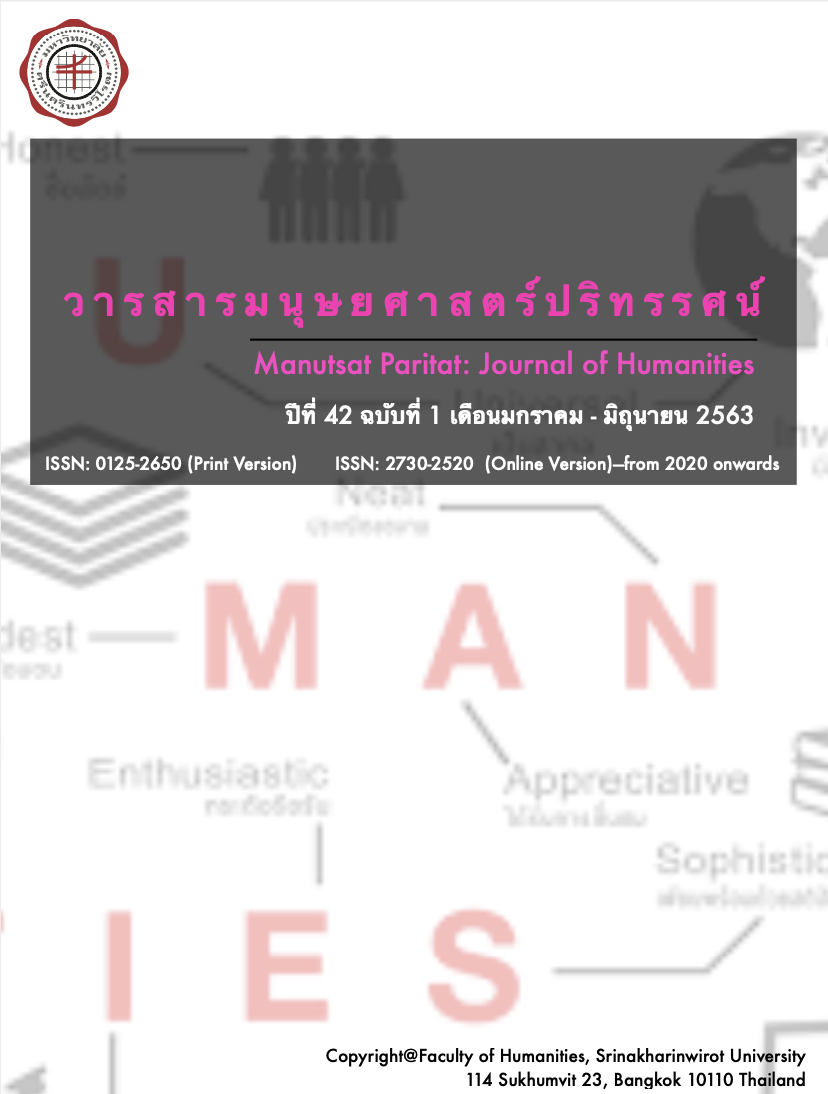แนวคิดอัตมโนทัศน์กับการประยุกต์
Main Article Content
Abstract
บทความนี้มีวัตถุประสงค์เพื่อนำเสนอแนวคิดอัตมโนทัศน์และการนำแนวคิดดังกล่าวไปประยุกต์กับกิจกรรมต่าง ๆ ของมนุษย์ โดยได้กล่าวถึงหลักการเบื้องต้นของแนวคิดอัตมโนทัศน์ จากนั้นได้ทบทวนงานวิจัยที่ประยุกต์แนวคิดนี้เพื่อศึกษาด้านการเรียนการสอน การสื่อสาร และการบริหารทรัพยากรมนุษย์ ซึ่งเป็นที่ประจักษ์ว่าแนวคิดอัตมโนทัศน์เป็นแนวคิดพื้นฐานที่สำคัญและจำเป็นในการดำรงชีวิตของมนุษย์ทุกช่วงวัย ผู้ที่มีความเข้าใจในหลักการของแนวคิดนี้จะเป็นผู้ที่ตระหนักถึงคุณค่าในตนเอง มีความสามารถในการพัฒนาศักยภาพของตนเองและผู้อื่น สร้างความเข้าใจอันดีระหว่างกันในบริบทสังคมต่าง ๆ อันจะส่งผลให้กิจการต่าง ๆ สำเร็จลุล่วงไปได้ด้วยดี
Article Details
Any unauthorized copying, publication, reproduction or distribution of copyrighted works appeared in Manutsat Paritat: Journal of Humanities is an infringement of the copyright owners’ rights. To authorize the copying, publication, reproduction or distribution of copyrighted works to be appeared in other printed materials or any online media, please write to MPJHthaijo@gmail.com for permission.
References
ภัทรพร ประทุมฝาง. (2546). อัตมโนทัศน์และกระบวนการสื่อสารของสตรีผู้ถูกกระทำรุนแรง ที่เข้ารับความช่วยเหลือ ณ บ้านพักฉุกเฉิน สมาคมส่งเสริมสถานภาพสตรี. วิทยานิพนธ์นิเทศศาสตรมหาบัณฑิต จุฬาลงกรณ์มหาวิทยาลัย.
ศรีเรือน แก้วกังวาล. (2554). ทฤษฎีจิตวิทยาบุคลิกภาพ: รู้เรา รู้เขา. กรุงเทพฯ: หมอชาวบ้าน.
สุนทรพจน์ ดำรงพานิช. (2550). โมเดลการจัดลำดับความสัมพันธ์เชิงสาเหตุของอัตมโนทัศน์วิชาการ อัตมโนทัศน์
ไม่ใช่วิชาการ และผลสัมฤทธิ์ทางการเรียน: การวิเคราะห์กลุ่มพหุ. วารสารวิธีวิทยาการวิจัย. 21(2): 204-223.
อรวรรณ ขำสุวรรณ. (2545). การสื่อสารในสถานสงเคราะห์คนชราประเภทเสียค่าบริการของรัฐบาลและเอกชน. วิทยานิพนธ์นิเทศศาสตรมหาบัณฑิต จุฬาลงกรณ์มหาวิทยาลัย.
Antunes, C.; & Fontaine, A. M. (2003). Adolescents’ Perceptions of their Parents’ Attitudes Towards Academic Performance: Their Relation with Academic Performance, Academic Self-Concept and Global Self-Esteem. Paper presented at the 10th Conference of European Association for Research on Learning and Instruction, Nicosia.
Boxall, P., Purcell, J., & Wright, P. (2008). The Oxford Handbook of Human Resource
Management. Oxford, UK: Oxford University Press.
Burgoon, J.K. & Le Poire, B.A. (1999). Nonverbal cues and interpersonal judgements: participant
and observer perceptions of intimacy, dominance, composure and formality. Communication Monographs, 66: 105–124
Craven, R. G.; & Marsh, H. W. (2008). The Centrality of the Self-Concept Construct for Psychological
Wellbeing and Unlocking Human Potential: Implications for Child and Educational Psychologists. Educational and Child Psychology. 25(2): 104-118.
Communication for Business Professionals. (2018). Retrieved from
https://ecampusontario.pressbooks.pub/commbusprofcdn/chapter/self-concept/
De Vito, J.A. (2001). The Interpersonal Communication Book (9th Ed). Longman: New York
Green, J.; Nelson, G.; Martin, A. J.; & Marsh, H. (2006). The Causal Ordering of Self-Concept and Academic Motivation and Its Effect on Academic Achievement. International Education Journal. 7(4): 534-546.
Hyseni Duraku, Zamira & Hoxha, Linda. (2018). Self-esteem, study skills, self-concept, social support, psychological distress, and coping mechanism effects on test anxiety and academic performance. Health Psychology.
concept, intrinsic motivation, test anxiety, and academic
achievement among nursing students: Mediating and moder-
ating effects. Nurse Education Today 35(3): 432–438
Khalaila R (2015) The relationship between academic self-
concept, intrinsic motivation, test anxiety, and academic
achievement among nursing students: Mediating and moder-
ating effects. Nurse Education Today 35(3): 432–438
Johnson, D.W. 20000 Reaching Out: Interpersonal Effectiveness and Self-actualization (8th Ed.).
Allyn and Bacon: Boston
Khalaila R. (2015). The relationship between academic selfconcept, intrinsic motivation, test anxiety, and academic achievement among nursing students: Mediating and moderating effects. Nurse Education Today 35(3): 432–438.
Modestino, A.S., Sugiyama, K., & Ladge, J. (2019). Careers in construction: An examination of the
career narratives of young professionals and their emerging career self-concepts. Journal of
Vocational Behavior, 115, Article 103306. Retrieved from
https://www.sciencedirect.com/science/article/abs/pii/S0001879119300648
Narayan, A., & Steele-Johnson, D. (2012). Individual and relational self-concepts in a team
context: Effects on task perceptions, trust, intrinsic motivation, and satisfaction. Team
Performance Management, 18(5/6), 236-255
Ng, J.A.I. (2014). Management in the Context of Self-Concept and its Impact on the Job
Performance of College Full-Time Faculty Members at De La Salle Lipa. AXIS: Journal of
Lasallian Higher Education 5(3), 1-32. Retrieved from https://axis.smumn.edu/wp-
content/uploads/2018/01/124-539-1-PB.pdf
Prabhakararao Sampthirao. (2016). Self-concept and interpersonal communication. The
International Journal of Indian Psychology, 3(6): 177-189.
Sacks, H., Schegloff, E. A., & Jefferson, G. (1974). A simplest systematics for the organization of
turn-taking for conversation. Language, 50: 696–735.
Shavelson, R. J.; Hubner, J. J.; & Stanton, G. C. (1976). Self-Concept: Validation of Construct Interpretations. Review of Educational Research. 46: 407-441.
Shavelson, R. J.; & Bolus, R. (1982). Self concept: The Interplay of Theory and Methods. Journal of Educational psychology. 74(1): 3.
Sims, R. (2002). Organizational Success through effective human resources management.
Westport, CT: Quorum


